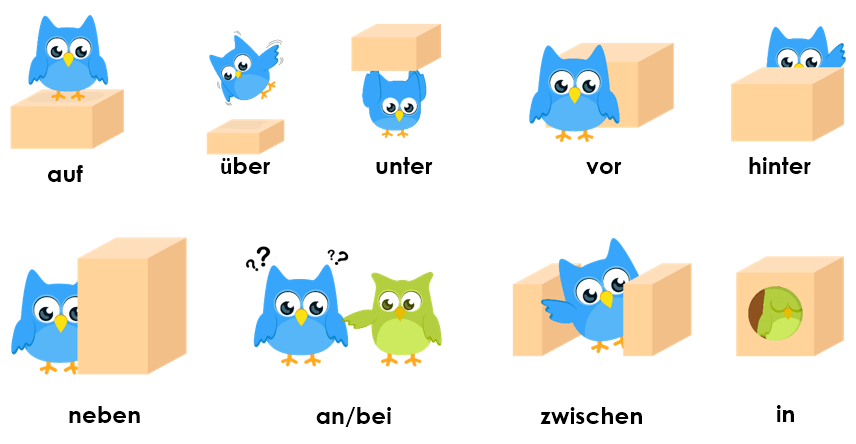What are Local Prepositions? (Lokale Präpositionen)
Lokale Präpositionen are related to a location or movement.
They can be used to describe the following situations:

They are normally used with the Dative or Accusative case.
Lokale Präpositionen Answering the Question: Wo?
Almost all local prepositions can be used to answer the question „Wo?“. When answering „Wo?“, they ALWAYS require the dative case.

„bei” vs. „an”
„Bei“ and „An“ have similar meanings, but are used in different situations. „Bei“ can always be used, while „an“ can't be used with people.
- „Ich bin bei Anna.“ ⇒ I'm at Anna's house / close to Anna.
- „Ich bin an/bei der Bushaltestelle.“ ⇒ I am close to the bus stop.
„Bei“ always requires the dative case. All other prepositions listed here can also answer the question „Wohin?” (and would then require the accusative case). More info about prepositions that can take both the accusative or dative case is in my lesson on two-case prepositions.
Lokale Präpositionen Answering the Question: Woher?
The prepositions „aus“ and „von“ express coming from a specific direction. They answer the question: „Woher?“
Both prepositions use dative, ALWAYS!
Preposition „aus”
„Aus“ describes leaving something or somewhere physically
That means the subject has to be inside something (i.e. a building) and then leave it. It's also used with countries, cities, and regions without articles.

Preposition „von“
„Von“ describes coming from a specific point or area.
You don't necessarily have to have been "inside" the place:
- „Ich komme vom Bahnhof.“ (Around the station, but maybe not the actual building)
If you can not physically leave something, you have to use "von":
- „Ich komme vom Einkaufen.“
You can't leave „Einkaufen“ ⇒ „von“
Lokale Präpositionen Answering the Question: Wohin?
All prepositions that can be used to answer „Wo?“ can be used to answer „Wohin?“ except for „bei“. Instead of „bei“ we use „zu“ or „nach“.
When describing the movement, use the same preposition that’s used to describe the ending position.
- „Ich gehe auf die Kiste.“
Prepositions that describe both the location and movement are called Two-Case Prepositions (Wechselpräpositionen).
Two-Case Prepositions (Wechselpräpositionen)
It works the same with the other so-called Two-case Prepositions (auf, über, unter, vor, hinter, in, neben, an, and zwischen)

More about German Two-Case-Prepositions
„in“ vs. „zu”
„In“ and „zu“ are the opposite of „aus“ and „von“:

„zu“ vs. „nach“
„zu“ and „nach“ mean the same thing. You go to somebody or something.
„Nach“ is used for continents, countries, cities, and regions. For everything else we use „zu“.
- „Ich gehe nach Deutschland.“
- „Ich fliege nach Amerika.“
- „Ich fahre nach Berlin.“
- „Ich fahre nach Sachsen.“
BUT: „Ich fahre zu meiner Oma.“
Exception for „nach“: If the country or region requires an article (like Switzerland: „die Schweiz“) we use „in“ instead of „nach“:
- „Ich fahre nach Deutschland.“ BUT: „Ich fahre in die Schweiz.“
- „Ich fliege nach Kalifornien.“ „Ich fliege in die Toskana.“
Additional Lokale Präpositionen
Preposition „durch“
The preposition „durch“ describes going through something.
- „Ich fahre durch den Tunnel.“
- „Ich springe durch den Reifen.“
- „Der Mann geht durch die Tür.“
- „Wir fliegen durch einen Sturm.“

„Durch“ is always followed by a noun in the accusative case.
Preposition „um ... herum”
The preposition „um … herum“ describes going around something.
- „Ich gehe um den Baum herum.“
- „Ich fahre um das Schild herum.“
- „Der Mann geht um den Zaun herum.“
- „Wir wandern um den Berg herum.“

The preposition „um … herum“ is a two-part preposition. The noun goes between the two parts. If it’s clear from the context what’s happening, the „herum“ can be left out.
The preposition „um“ is always followed by a noun in the accusative case.
Preposition „gegenüber”
The preposition „gegenüber“ describes being on the other side of the street.
- „Ich bin gegenüber der Bank.“
→ I am on the side of the street opposite the bank.
- „Ich stehe gegenüber der Post.“
→ I am in front of the post office, but on the other side of the street.

„Gegenüber“ is always followed by a noun in the Dative case.
Gramato: Your German Grammar Coach
Try Gramato now!
Powered by EasyDeutsch AI

This is how Gramato can help you!
Gramato helps you with all your German grammar questions – fast, to the point, and always based on the trusted content from https://easy-deutsch.com.
Gramato offers fill-in-the-blank exercises on a variety of grammar topics, tailored to your level so you can practice exactly what you need.
Get answers in multiple languages – German, English, Spanish, French, and more. That way, you can understand grammar in the language you feel most comfortable with.
Clear and simple grammar explanations – so you can learn faster and smarter with Gramato.
Ask your questions or practice anytime with Gramato – no wait, just results!
Related Topics:
Entire lesson in German only: Lokale Präpositionen
Here you will find an overview of all topics related to German Prepositions:
- Was sind Präpositionen? (What are Prepositions?)
- Temporal Präpositionen (Temporal Prepositions)
- Wechselpräpositionen (Two-case Prepositions)
- Präpositionen mit Artikeln (Prepositions with Articles)
- Zweiteilige Präpositionen (Two-Part Prepositions)
- Fragen mit Präpositionen (Questions with Prepositions)
- Präpositionen mit Akkusativ (Prepositions with Accusative)
- Präpositionen mit Dativ (Prepositions with Dative)
- Präpositionen mit Genitiv (Prepositions with Genitive)
- Verben mit Präpositionen (Verbs with Prepositions)
The Prepositions always determine the case. Therefore, you must be familiar with the deutschen Fällen (German cases):
You can find an overview of all topics under German Grammar.
Recommendation: Free video lessons every Tuesday & Thursday
Sign up now: Email German Grammar course



